#lowcarbonfuture
Explore tagged Tumblr posts
Text
Carbon Dioxide Market Evolution: From Emissions Regulation to Renewable Energy Integration
The global carbon dioxide market size is expected to reach USD 15.46 billion by 2030, expanding at 5.0% CAGR from 2024 to 2030, according to a new report by Grand View Research, Inc. The growth is majorly driven by the increasing usage of CO2 for enhanced oil recovery (EOR) in oil & gas plants.carbon dioxide (CO2) is considered to be among the major and most extensively utilized medical gases. Furthermore, in the medical industry, CO2 is used in respiratory and cryotherapy stimulation during the process and post-anesthesia application. In cryotherapy, CO2 in frozen form (–78.5 °C) is used for killing body cells via a crystallization process. This gas can also be used in several processes to remove moles, skin tags, and warts.
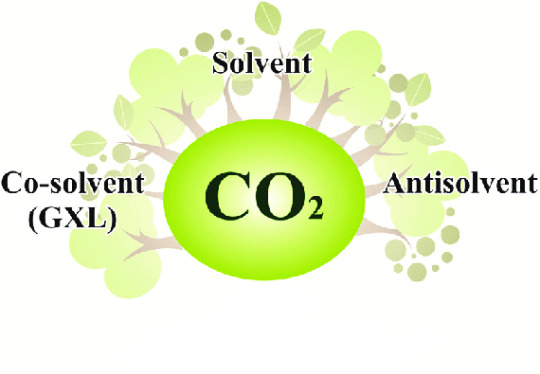
Carbon Dioxide Market Report Highlights
Ethyl alcohol dominated the source type by accounting for a revenue share of 33.0% in 2023. It is projected to grow at the highest growth rate of 5.2% from 2024 to 2030 owing to its reliability as an easily available long-term source and high commercial value in producing CO2 as a by-product
Further, growth in demand for food-grade carbon dioxide in the forecast period will boost the growth of the production of carbon dioxide from ethyl alcohol
The food and beverages application segment of the market is anticipated to grow at a CAGR of 5.7% from 2024 to 2030, by revenue, thanks to rising demand for carbonated drinks globally
North America accounted for the largest revenue share of 42.0% of the CO2 industry in 2023. It is expected to continue its dominance over the forecast period. This can be attributed to increasing R&D, expansion of the industrial sector & growth of enhanced oil recovery processes
For More Details or Sample Copy please visit link @: Carbon Dioxide Market Report
CO2 also finds application in modern medicine to minimize invasive surgeries. In medicinal baths, it induces warm sensations and acts as a vasodilator for the skin by stimulating its heat receptors. In addition, insufflation with CO2 makes it easier to perform endoscopic procedures.
CO2 can be produced and recovered through various sources such as ethyl alcohol, hydrogen, ethylene oxide, substitute natural gas, and various other sources. Further, current research & development to capture carbon emissions has gained momentum. New research and development do not only aim to capture the CO2 in the form of carbon emissions but to refine and reuse it for some applications.
The carbon capture and storage (CCS) technology is capable of delivering considerable emission reductions from the utilization of fossil fuels. It is capable of lowering emissions from a wide range of industries such as power generation, steel, iron, refining, petrochemicals, and cement manufacturing. CCS technologies include capture, transport, and storage. Capture technology includes post-combustion, pre-combustion, oxy-firing, and industrial separation.
The key players in this industry are Air Products and Chemicals Inc.; Messer SE & Co. KGaA; Air Liquide; Linde Plc to maintain the market, share. Large firms frequently engage in mergers and acquisitions as well as new product launches. For instance, In September 2022, Covestro and SOL Kohlensäure GmbH & Co. KG signed a memorandum of understanding for collaboration in regards to the supply of biogenic CO2, effective from September 2022.
#CarbonDioxideMarket#CarbonDioxide#CO2#CarbonTrading#CarbonOffsets#CarbonCapture#EmissionsReduction#GreenEconomy#CarbonMarket#Decarbonization#ClimateFinance#LowCarbonFuture#EmissionsTradingSystem#CarbonFinance
0 notes
Text
Calling all European Fleet Operators! Make My Day and Cnaan Aviv are attending the Fleet Europe 2023 summit in Lisbon, Portugal next week, on November 22 & 23!

Did you know that 99% of fleets worldwide haven’t transitioned to electric vehicles yet, primarily due to the lack of the right tools for the Electrification process and electric vehicle management? That is where Make My Day comes into the picture. Make My Day Simplifies the Electrification process, EV fleet charging, and operation with smart software solutions for EV drivers and fleets.
Come and discover how we can help you with your fleet's electrification at the Fleet Europe 2023 summit on November 22 & 23, and schedule your meeting with Cnaan Aviv F2F: [email protected]
#FED2023#Sustainability#FleetEurope#Fleet#Mobility#FleetManagers#fleet#lowcarbon#lowcarbonfootprint#lowcarbonfuture#EV#electricvehicle#electricvehiclecharging#EVs#electricvehicles#fleets#fleetelectrification#electrification#fleetoperations#Innovation#API#databattery#road#transportation#telematics#vehicle#EVsolutions#EVfleetmanagement#cleantech#energy
0 notes
Link
#AccessingClimateFunding#Climateaction#ClimateFinance#Economicgrowth#GlobalCollaboration#GreenGrowthInstitute#LowCarbonFuture#PacificResilience#Sustainabledevelopment#UKPartnership
0 notes
Text
Nuclear Power Plant Canada - World’s Largest Being Planned
Nuclear Power Plant Canada – World’s Largest Being Planned . Canada is planning to construct the largest nuclear power plant in the world as part of efforts to combat climate change and meet the rising demand for clean energy. Bruce Power, a Canadian utility company, has announced its intention to expand its existing nuclear facility in Ontario. The government of Ontario has granted permission…

View On WordPress
#BrucePower#Canada#cleanenergy#Climatechange#Decarbonization#ElectricityGeneration#EnergyDemand#EnergyExpansion#EnergyInfrastructure#EnergyTransition#EnvironmentalImpact#Gigawatts#LowCarbonFuture#NuclearPower#NuclearPowerPlant#NuclearSafety#Ontario#PowerGeneration#renewableenergy#SustainableEnergy
0 notes
Link
0 notes
Text
The Role of Renewables in Decarbonisation
Written By: Jagriti Shahi
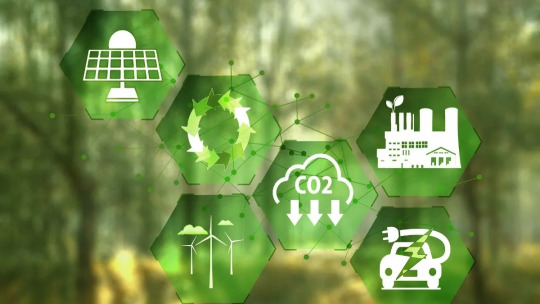
Introduction:
As the world grapples with the urgent need to mitigate climate change, the imperative for decarbonization has become increasingly apparent. At the forefront of this global effort are renewable energy sources, which play a pivotal role in reducing greenhouse gas emissions and transitioning towards a sustainable energy future. In this article, we delve into the multifaceted role of renewables in decarbonization, exploring their benefits, challenges, and the path forward.

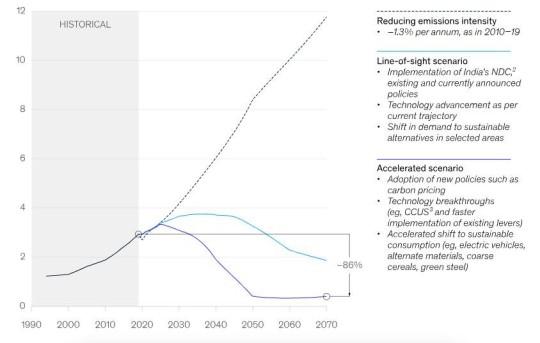
Figure: An overview and possible decarbonisation pathways for India - Source: Mckinsey & Company
The Rise of Renewables:
Renewable energy sources, such as solar, wind, hydro, and biomass, have witnessed remarkable growth and technological advancements in recent years. This surge can be attributed to several factors, including declining costs, policy support, and heightened environmental awareness. Notably, renewables have emerged as competitive alternatives to fossil fuels, offering cleaner, more sustainable energy solutions.
Decarbonization Imperative:
Decarbonization, the process of reducing carbon dioxide and other greenhouse gas emissions, is crucial for mitigating climate change and achieving global climate targets, such as those outlined in the Paris Agreement. The energy sector, being a significant contributor to greenhouse gas emissions, holds immense potential for decarbonization through the adoption of renewable energy technologies.
The Role of Renewables:
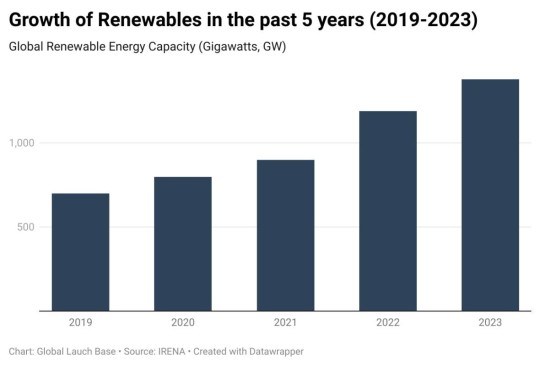
Figure: Growth of Renewables in the past 5 years
Renewable energy sources play a multifaceted role in decarbonization across various sectors:
Power Generation: Renewables are instrumental in decarbonizing electricity generation, displacing carbon-intensive sources like coal and natural gas. The scalability and versatility of renewables enable the deployment of clean energy infrastructure on a global scale, driving the transition towards low-carbon electricity grids.
Transportation: The electrification of transportation, facilitated by renewable energy, is pivotal for reducing emissions from the transport sector. Electric vehicles (EVs) powered by renewable electricity offer a sustainable alternative to conventional internal combustion engine vehicles, thereby curbing emissions and improving air quality.
Heating and Cooling: Renewable energy technologies, such as solar thermal and geothermal systems, hold promise for decarbonizing heating and cooling in buildings and industrial processes. By harnessing renewable heat sources, it is possible to reduce reliance on fossil fuels for heating purposes, contributing to overall emissions reduction.
Industry and Agriculture: Renewable energy integration in industrial processes and agriculture can mitigate emissions associated with manufacturing, processing, and agricultural activities. From solar-powered factories to bioenergy production from agricultural waste, renewables offer innovative solutions for decarbonizing these sectors.
Renewables in Low Carbon Construction:
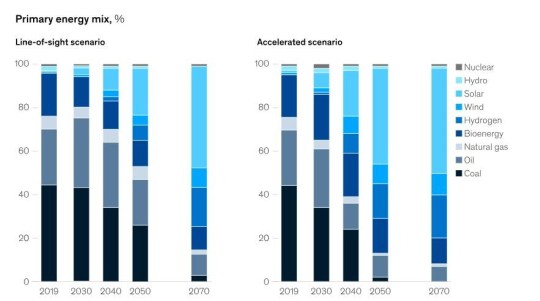
Figure: Primary Energy Mix,% Source: Mckinsey & Company
Low carbon construction encompasses practices and technologies aimed at minimizing carbon emissions associated with building materials, construction processes, and building operation. Renewable energy plays a crucial role in this context through several avenues:
Renewable Energy Integration: Incorporating renewable energy systems, such as solar panels and wind turbines, into building designs reduces reliance on carbon-intensive grid electricity for powering homes and commercial buildings. Additionally, utilizing renewable energy for heating and cooling purposes in buildings mitigates emissions associated with traditional heating fuels like natural gas.
Sustainable Materials: Renewable resources can be utilized to produce sustainable building materials, such as bamboo, timber, and recycled materials. These materials not only have lower embodied carbon compared to traditional counterparts but also contribute to biodiversity conservation and sustainable land management.
Energy Efficiency: Renewable energy complements energy-efficient building design and technologies, enhancing overall energy performance and reducing operational carbon emissions. Integrating renewables with energy-efficient measures, such as insulation, efficient lighting, and smart building controls, maximizes energy savings and minimizes environmental impact.
Carbon Capture, Use & Storage (CCUS):
CCUS technologies are instrumental in capturing carbon dioxide emissions from industrial processes and power generation facilities, preventing their release into the atmosphere. The captured CO2 can then be utilized in various applications or stored underground, effectively reducing net emissions. Renewables play a vital role in CCUS through the following mechanisms:
Powering CCUS Facilities: Renewable energy sources provide low-carbon electricity to power CCUS facilities, reducing the carbon footprint of the capture and storage process. By utilizing renewable electricity instead of fossil fuels, CCUS operations can achieve significant emissions reductions while ensuring sustainable operation.
Renewable Hydrogen Production: Renewable energy, particularly solar and wind power, can be utilized to produce renewable hydrogen through electrolysis. This renewable hydrogen serves as a clean energy carrier for industrial processes and transportation, enabling decarbonization in sectors where direct electrification may be challenging.
Carbon Utilization: Renewable energy can facilitate carbon utilization technologies, where captured CO2 is converted into valuable products such as synthetic fuels, chemicals, and building materials. By coupling CCUS with renewable energy-driven conversion processes, carbon emissions are not only mitigated but also utilized in a circular and sustainable manner.
Challenges and Opportunities:
While the integration of renewables with low carbon construction and CCUS offers significant potential for decarbonization, several challenges must be addressed. These include technological limitations, cost competitiveness, policy frameworks, and public acceptance. Overcoming these challenges requires collaborative efforts from governments, industry stakeholders, and research institutions to drive innovation, scale deployment, and create supportive regulatory environments.
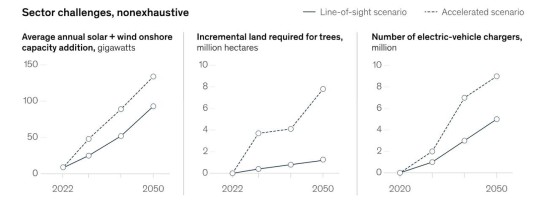
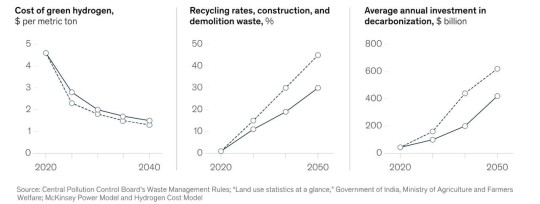
Figure: Sector Challenges, Source: Mckinsey & Company
The Path Forward:
To harness the synergies between renewables, low carbon construction, and CCUS effectively, concerted action is needed at the global, national, and local levels. This includes:
Setting ambitious decarbonization targets and policies that incentivize the adoption of renewables, promote low carbon construction practices, and support CCUS deployment.
Investing in research, development, and innovation to advance renewable energy technologies, low carbon materials, and CCUS solutions.
Fostering collaboration among governments, businesses, and communities to accelerate the transition to a low-carbon economy and achieve net-zero emissions.
Conclusion:
Renewable energy, coupled with innovative approaches such as low carbon construction and CCUS, holds immense promise in driving decarbonization across multiple sectors. By leveraging the synergies between these strategies, we can mitigate carbon emissions, enhance resilience to climate change, and pave the way for a sustainable future. Now is the time to embrace renewables as catalysts for transformative change and forge a path towards a low-carbon society.
#Renewables hashtag#Decarbonisation hashtag#SustainableEnergy hashtag#CleanEnergy#hashtag#RenewableEnergySources hashtag#SolarPower hashtag#WindEnergy hashtag#ClimateAction#GreenEnergy hashtag#CarbonReduction hashtag#EnergyTransition hashtag#EnvironmentalSustainability hashtag#RenewablePowerGeneration#LowCarbonFuture hashtag#EnergyInnovation
0 notes
Text
Grey Hydrogen: $3.2B → $4.5B (2033), CAGR 3.5%.
Grey Hydrogen Market : Grey hydrogen, produced primarily through natural gas reforming, is currently the most widely used form of hydrogen in industrial applications. However, it comes with a significant environmental downside, as the production process releases substantial amounts of CO2 into the atmosphere. Despite its role in various industries, such as ammonia production, refining, and steel manufacturing, grey hydrogen is increasingly being scrutinized due to its carbon-intensive nature. This has led to growing concerns about its contribution to global emissions and the need for cleaner alternatives.
To Request Sample Report : https://www.globalinsightservices.com/request-sample/?id=GIS25103 &utm_source=SnehaPatil&utm_medium=Article
The demand for grey hydrogen remains high, but the industry is under pressure to transition to more sustainable methods of production. While grey hydrogen itself isn’t clean, there is potential to reduce its environmental impact through carbon capture, utilization, and storage (CCUS) technologies. These solutions can capture the CO2 emissions produced during hydrogen generation and store them underground, thereby reducing the overall carbon footprint. However, this approach is still in development and faces challenges related to cost, scalability, and infrastructure.
As the world shifts toward decarbonization, the focus is increasingly on “green hydrogen” and “blue hydrogen” as cleaner alternatives. Green hydrogen, produced through electrolysis using renewable energy, is gaining momentum, while blue hydrogen, which involves the capture of carbon emissions, is seen as a transitional solution. The evolution of hydrogen production methods, including transitioning away from grey hydrogen, is crucial for achieving net-zero targets and addressing climate change.
#GreyHydrogen #HydrogenEconomy #CleanEnergy #SustainableEnergy #CarbonCapture #BlueHydrogen #EnergyTransition #GreenHydrogen #LowCarbonFuture #HydrogenProduction #ClimateAction #Decarbonization #GreenEnergy #SustainableFuture #CarbonReduction
0 notes
Text
Clean Hydrogen Production Technology Market Projected to Reach $14.8B by 2033, Growing from $4.5B in 2023 with 12.1% CAGR
Clean Hydrogen Production Tech Market : Clean hydrogen production technologies are at the forefront of global efforts to transition to a low-carbon economy. With methods such as electrolysis powered by renewable energy and advancements in methane pyrolysis, the industry is moving closer to achieving scalable and cost-effective solutions. Hydrogen produced without greenhouse gas emissions holds immense potential for decarbonizing critical sectors, including transportation, heavy industry, and energy storage. Governments and private stakeholders worldwide are heavily investing in R&D, scaling production facilities, and establishing green hydrogen hubs to meet the rising demand.
To Request Sample Report : https://www.globalinsightservices.com/request-sample/?id=GIS32616 &utm_source=SnehaPatil&utm_medium=Article
The impact of clean hydrogen extends beyond environmental benefits. As a versatile energy carrier, hydrogen is key to energy resilience, bridging gaps between renewable energy supply and demand. Innovations in technologies like solid oxide electrolyzers and carbon capture integrated with blue hydrogen production are accelerating adoption across industries. This evolution not only addresses climate goals but also opens pathways for job creation and economic growth in emerging green markets. With international collaborations driving infrastructure and policy support, clean hydrogen is poised to reshape the global energy landscape.
#CleanHydrogen #GreenEnergy #HydrogenRevolution #SustainableTech #NetZeroGoals #RenewableHydrogen #EnergyTransition #HydrogenEconomy #LowCarbonFuture #GreenInnovation #ClimateAction #HydrogenStorage #FutureOfEnergy #Decarbonization #GlobalSustainabilit
0 notes
Text
Spent Nuclear Fuel Waste Management ⚛️: $3.5B to $6.8B by 2033, 6.2% CAGR
Spent Nuclear Fuel Waste Management Market : Spent nuclear fuel waste management is a critical issue at the intersection of energy production and environmental responsibility. As nuclear power continues to provide a reliable source of low-carbon energy, managing the radioactive waste it generates is essential to ensure both public safety and environmental protection. Advanced waste management methods, including deep geological storage and innovative containment materials, aim to securely isolate spent fuel for thousands of years, preventing harmful radiation from impacting ecosystems or communities. These strategies not only address immediate waste storage concerns but also lay the groundwork for safer, long-term waste solutions.
To Request Sample Report : https://www.globalinsightservices.com/request-sample/?id=GIS325717&utm_source=SnehaPatil&utm_medium=Article
With continued research and investment, the field of nuclear waste management is evolving, exploring options like recycling spent fuel for reuse in advanced reactors or developing compact storage solutions to minimize land use. The goal is to create a sustainable cycle for nuclear materials that balances energy needs with a commitment to environmental health. By supporting effective waste management policies and investing in technological advancements, we can pave the way for a cleaner energy future while minimizing nuclear waste’s impact on future generations.
#NuclearWasteManagement #SpentFuel #EnergySecurity #SustainableEnergy #EnvironmentalProtection #NuclearSafety #LowCarbonFuture #WasteContainment #GeologicalStorage #RecyclingNuclearFuel #EnergyInnovation #SafeStorage #CleanEnergy #PublicSafety #FutureEnergy
0 notes
Text

🌍 Embracing change for a sustainable future! Join CGFS LLC as we explore a pragmatic path toward transitioning away from oil and gas. Our commitment to navigating economic shifts aligns with global sustainability goals. Let's pave the way together towards cleaner, innovative energy solutions.
Connect with us: 🌐 Website: www.cgfsllc.com 📧 Contact us: [email protected] 📌 Follow us on social media: https://www.facebook.com/CGFSLLC/
Following Information Link: https://www.cognitoforms.com/internationalfunding1/fundingapplicationintakeinformationformtahmed
#SustainableFuture #EconomicTransition #CGFSLLC #EconomicTransition #RenewableFuture #SustainableEconomy #EnergyTransition #CleanEnergyShift #GreenEconomy #FutureOfEnergy #ClimateAction #TransitionToRenewables #LowCarbonFuture #SustainableDevelopment #EnergyDiversification #ResponsibleInvestment #Decarbonization #EnvironmentalResponsibility 🌿💡✨
0 notes
Text
Make My Day is thrilled to actively engage in Autonomy's Mobility World Online summit!

Hanan Klainer, our VP of Sales, will be attending the conference, on November 15-16, and Cnaan Aviv, our CTO & Co-Founder, will be speaking on the panel "Corporate fleets: how will they decarbonize?", on 16 November 2023, at 02:00 PM.
Contact us to schedule meetings with the team: https://lnkd.in/gUJSb7qQ Secure your spot by registering today: https://lnkd.in/gPuFp9Sn
EcoMotion CommunityNisan Katz
#GreenFleets#CorporateSustainability#Decarbonisation#EVs#AutonomyMobilityWorld#fleet#lowcarbon#lowcarbonfootprint#lowcarbonfuture#EV#electricvehicle#electricvehiclecharging#electricvehicles#fleets#fleetelectrification#electrification#fleetoperations#autonomy#Autonomymobilityworldsummit#amwa2023#AMWA2023#AMWO#event#confrence#France#Paris#Europe
0 notes
Photo

Our climate justice fever is searing 🔥🔥🔥. 500 million animals 🐨 🐨🐂🐄🦌🐐🐕🐴🐇🐾killed in Australia from fires that could’ve been less damaging by controlled burns with govt subsidies. We the people must act to turn the crisis around ⏱our leaders have failed us. Vote them out of office in 2020. ⬇️Double tap and tag your friends if you agree! #voteyourdollars #bethechange #investforimpact #impacthero #movingimpactforward 2 0 2 0 #investinfuture #forceforgood #socialimpact #moneyandmeaning #impacteconomy #lowcarbonfuture #sociallyconscious #consciousinvestor #socialentrepreneur #socialpurpose #leadingbyexample #lowcarbontransition #divestfossilfuels #drawdown #actnow #climatejustice #noplanetb #ourfuture #notimetowaste #childrendeservebetter #sixthextinction #savebiodiversity #lessplastic #impactnation #investingforgood https://www.instagram.com/p/B7B67bYl5ZV/?igshid=6llvgrfekmr4
#voteyourdollars#bethechange#investforimpact#impacthero#movingimpactforward#investinfuture#forceforgood#socialimpact#moneyandmeaning#impacteconomy#lowcarbonfuture#sociallyconscious#consciousinvestor#socialentrepreneur#socialpurpose#leadingbyexample#lowcarbontransition#divestfossilfuels#drawdown#actnow#climatejustice#noplanetb#ourfuture#notimetowaste#childrendeservebetter#sixthextinction#savebiodiversity#lessplastic#impactnation#investingforgood
0 notes
Text
Nurturing Innovation for a Low-Carbon Future
Let's move #renewables to the market! - new video from @IRENA #energy #renewables #lowcarbonfuture
Renewable energy innovation is starting to really change gears. In the last couple of years, most of the new power generation capacity added has been renewable. A rapid scale-up in renewable energy deployment will be supported by innovation in technology accompanied by innovation in infrastructure, business models, system operation,…
View On WordPress
0 notes
Photo


Columbia Global Summit: Paving a Way to a Low Carbon Future
The most proficient and prominent minds gathered yesterday for the 2015 Columbia Global Summit. The Summit’s best, discussed environmental and energy issues, solutions and the context in which they exist, bringing these topics to the forefront as our planet’s needs are taking priority. The summit takes place on the two year anniversary of Columbia opening the Center of Global Energy Policy, a division of The School of International affairs (SIPA).
The opening speaker, Merit E. Janow (dean of SIPA), gave the audience insight into the division of Columbia. He said “energy lies at the nexus of many of the world’s problems”, validating the work and creation of the Center of Global Energy Policy. He spoke about the new program “Woman in Energy” which is training the next generation of woman to tackle the energy crisis while maintaining gender equality in the workforce. The efforts for the program have cause to celebrate because it is expanding from the regional to the national level.
The next speaker was Gina McCarthy. She has worked for the White house and now is an administrator for EPA (Environmental Protection Agency). She talked about her experience at the Whitehouse and how she thought that things would slow down once she left (which they didn’t). She applauded the work Columbia had done stating “the center has become a platform for environmental issues and the timely response to them”. She was passionate about one point: a low carbon future.
McCarthy illustrated the actions EPA will be mirrored by the way energy is dealt with ultimately make a low carbon future not only a necessity, but the reality. The main issue with environmental and energy ethics is that they have not coincided with the capitalistic growth model and consumption of goods that runs our economy. It was believed that up until this point a growing economy and a healthy planet couldn't be simultaneously achieved, it was one or the other.
McCarthy is mixing two previously believed to incompatible ideas to lead the U.S. towards a brighter low carbon future. By utilizing large model technologies referred to as carbon scrubbers- she says we can both grow the economy and lower carbon. These carbon scrubbers would take shape of plants that could filter the air which is especially important since that is the job of our planets vegetation which has been reduced 45% planetwide in the past 100 years as well as a large output of carbon emissions. These will create jobs and commodity of clean low carbon air could be taxed to governments. These systems would be placed near large cities that produce the most carbon and in places such as where coal is burned. This will cut carbon output at energy plants without adding costs or delaying or reducing the supply.
This new system and technology which has been in development and is being unveiled as we speak will change the world and reduce greenhouse effects and salvage our planet. McCarthy closed her segment with “yes other Countries will want to emulate our work, but we got here first and will reap the most environmental and economic rewards, let them follow”.
Wanna know more about Carbon Scrubbing?
0 notes
Text
"Revolutionizing Energy: Small Modular Reactor Market Outlook 2024-2033"
Small Modular Reactors (SMRs) are reshaping the landscape of nuclear energy, offering a groundbreaking solution to meet the world’s growing demand for clean and reliable power. Unlike traditional large-scale nuclear reactors, SMRs are compact, scalable, and designed to be factory-built and transported to sites, significantly reducing construction costs and timelines.
These innovative reactors promise enhanced safety features, with passive cooling systems and advanced containment structures that minimize the risk of accidents and environmental impact. SMRs also support a diverse range of applications, from providing power to remote communities and military bases to complementing renewable energy sources in a balanced grid. The modular nature of SMRs allows for incremental scaling, adapting to varying energy needs and facilitating the transition to a low-carbon future. Additionally, the integration of advanced materials and technologies enhances efficiency and extends operational lifespans. As governments and industries invest in the development and deployment of SMRs, they are poised to play a pivotal role in sustainable energy solutions, contributing to global energy security and environmental stewardship.
#SmallModularReactors #NuclearEnergy #CleanPower #EnergyInnovation #SustainableEnergy #ModularDesign #AdvancedNuclear #LowCarbonFuture #EnergySecurity #TechAdvancements #PowerGeneration #NuclearTech #RenewableIntegration #FutureEnergy #GreenTech #CompactReactor #SafeEnergy #EnergyTransition #SmartGrid #SustainableSolutions
0 notes
Text
Iron Flow Batteries: Sustainable Energy Storage Solutions
Iron flow batteries represent a promising innovation in energy storage technology, leveraging the chemical properties of iron to provide scalable and efficient solutions for storing renewable energy. Unlike traditional lithium-ion batteries, iron flow batteries use iron-based electrolytes that are abundant, non-toxic, and inexpensive, making them highly sustainable and environmentally friendly.
These batteries operate by circulating iron ions between positive and negative electrodes, storing and releasing energy as needed. This design allows for deep cycling without degradation, ensuring long-term reliability and cost-effectiveness for grid-scale applications. Iron flow batteries excel in storing intermittent renewable energy sources like solar and wind power, helping to stabilize the grid by providing reliable backup power and smoothing out fluctuations in supply and demand. They also offer flexibility in deployment, ranging from small-scale residential installations to large industrial and utility-scale projects. Innovations in electrode design and electrolyte formulation continue to improve the efficiency and performance of iron flow batteries, driving down costs and expanding their market potential. As the world seeks sustainable energy storage solutions to support the transition to a low-carbon future, iron flow batteries are poised to play a significant role in enhancing grid resilience and promoting renewable energy integration. #IronFlowBattery #EnergyStorage #RenewableEnergy #GridScale #SustainableTechnology #CleanEnergy #EnergyInnovation #BatteryTechnology #IronElectrolyte #GridResilience #RenewablesIntegration #GreenEnergy #StorageSolutions #ElectrochemicalStorage #LowCarbonFuture #EnergyTransition #IronIon #EnvironmentalImpact #ScalableStorage #Innovation
0 notes